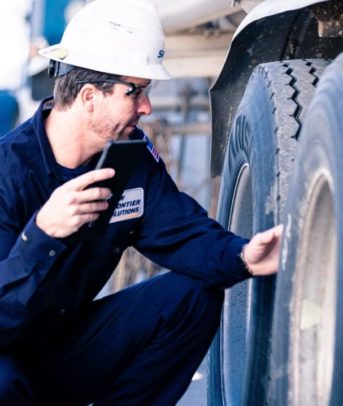Communication among fleets has traditionally consisted of paper and radio chatter, but technology has taken over to provide more efficient fleet communications. The level at which fleets have embraced technology varies; some drivers receive details for their deliveries via text message, while others don’t even have company email accounts. While the CB radio isn’t getting nearly the use it once did, it still serves its purpose. However, the use of smartphones and tablets have ushered in more technological methods for tasks such as monitoring traffic back-ups.
Moving away from paper-based communications increases fleet effectiveness. Filling out paperwork is time-consuming, and drivers often have a lot of duplicate work. Once the paperwork is submitted, often days later, someone else must transcribe the information — if it’s legible. Converting to processes such as electronic ticketing allows drivers to provide that information to the office as soon as they complete it. The accelerated communications keep everyone happy; the company receives the data it needs to begin invoicing faster, which can speed up payment to the driver, and the customer receives a clear and instant record of the work.
Attract and Retain Drivers
From greater efficiencies and fewer mistakes to better records management, the advantages of having a culture of communication are numerous. Building that culture helps make employees better communicators who feel welcomed to provide input to management. It also helps to attract and retain quality employees, a key benefit given the industry’s driver shortage. Teens preparing for the workforce today want to be able to use the same technology at work that they use to communicate in their personal lives.
Good communication within an organization not only provides employees with crucial information, but also it helps them stay engaged and maintain or increase morale. Drivers can often be part of a lonely workforce, especially those moving commodities in desolate areas. Some drivers go a week or more before getting back to a company base. Life on the road, in a hotel or driving away from home can leave drivers remote and disconnected, making reliable communication all the more important.
Improve Safety and Service
Comply365 provides the core tools fleet managers need to increase communication and productivity. These tools create a fleet workspace where drivers have access to all important documents such as equipment and company policy manuals on the same mobile device they’re accustomed to using in their personal lives. That information would be available regardless of connectivity.
When an incident arises such as an accident or a situation that will delay a delivery, drivers will have a messaging system that goes beyond a basic text message to alert all the parties involved. When it comes to documenting the incident, drivers and managers would have everything they need for reports and a dashboard in which to talk about how to prevent similar incidents.
Trucking professionals and fleet managers can take steps now to increase fleet communication, including:
- Being able to provide dispatch details quickly. Managers must find easy, efficient ways to track and submit runs and deliveries to drivers. Such solutions should be accessible and easy to use, even without connectivity.
- Using technology to submit frequent, standard forms such as driver vehicle inspection reports, maintenance requests and accident reports. Eliminate the paperwork and handwriting for quick, clear information.
- Getting drivers connected to the Internet. Connectivity can be a real challenge for the industry, especially when hauling in remote areas. Some drivers, for example, need to travel 80 miles just to reach Wi-Fi to transmit data.
Fleet communications have advanced, and technology continues to offer new tools to provide greater improvement. Building a strong culture of communication is key to recruiting and retaining a workforce that already faces a severe shortage. Embracing such a culture helps to engage drivers, minimize mistakes, create efficiencies and ultimately drive companies to a more profitable bottom line.
See what connected fleet solutions are available to help you meet company and driver needs.








